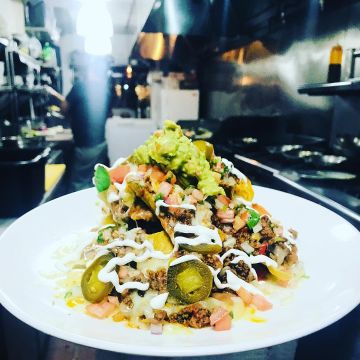Experience unforgettable mexican food that celebrates the tradition of Mexico
Wiki Article
Is Mexican Food Healthy? Unpacking the Nutritional Advantages of Standard Components
The concern of whether Mexican food is healthy and balanced welcomes an expedition of its typical components. Beans and corn act as foundational staples, abundant in protein and fiber. Avocados give beneficial fats, while various herbs and seasonings add taste and health and wellness benefits - take out and delivery. Together, these components produce a tapestry of nourishment. The healthfulness of Mexican food commonly depends on preparation methods and portion dimensions. What function do these variables play in establishing its total dietary worth?The Power of Beans: Healthy Protein and Fiber-Rich Staples
Typically overlooked, beans serve as a foundation of Mexican food, offering a riches of dietary advantages. Rich in healthy protein, they are an excellent plant-based alternative for those seeking to meet their dietary protein needs. This high healthy protein content supports muscle mass repair and growth, making beans very useful for both vegetarians and meat-eaters alike. In addition, beans are an exceptional source of dietary fiber, which assists in food digestion and promotes a feeling of fullness, possibly aiding with weight monitoring.The selection of beans utilized in Mexican dishes, such as black beans, pinto beans, and kidney beans, contributes to a varied flavor account and can enhance meals nutritionally. Moreover, beans are reduced in fat and have vital nutrients, including magnesium, iron, and folate. Together, these qualities make beans an important component, supplying both nutrition and nourishment in traditional Mexican fare.

Corn: a Versatile Grain With Nutritional Conveniences
Corn attracts attention as a flexible grain fundamental to Mexican cuisine, celebrated not just for its cooking applications however additionally for its remarkable nutritional profile. As a key component in meals like tortillas, tamales, and pozole, corn gives vital nutrients that contribute to a balanced diet. Rich in carbs, it offers as a considerable power source, while also being reduced in fat, making it a beneficial alternative for numerous dietary demands.Moreover, corn is a great source of dietary fiber, which helps in digestion and promotes satiety. It includes considerable quantities of vitamins such as B-complex vitamins, which are essential for basal metabolism. The existence of antioxidants, especially carotenoids, adds to overall wellness by decreasing oxidative anxiety. In addition, corn is gluten-free, dealing with those with gluten sensitivities. Generally, the dietary benefits of corn underscore its relevance in conventional Mexican food and its role in a healthy diet plan.
Avocados: Healthy And Balanced Fats and Nutrients in Every Bite
Avocados play a substantial role in Mexican cuisine, enhancing recipes with their luscious structure and abundant taste. Beyond their cooking appeal, avocados are commemorated for their remarkable dietary profile. They are a rich resource of healthy monounsaturated fats, which can assist reduced poor cholesterol levels and support heart wellness. Furthermore, avocados are loaded with essential vitamins and minerals, including potassium, vitamin E, and B vitamins, adding to general health.The high fiber material in avocados aids digestion and advertises satiation, making them a valuable enhancement to any dish. Their unique nutrient structure can also support skin health and wellness and give anti-inflammatory advantages. Integrating avocados right into typical Mexican dishes or enjoying them as a standalone treat can improve both flavor and nutrition, showing why they are a cherished staple in Mexican food. Generally, avocados provide a scrumptious method to appreciate healthy and balanced fats and important nutrients in every bite.

Natural Herbs and flavors: Flavorful Health And Wellness Boosters
While delighting in the abundant flavors of Mexican cuisine, one can not forget the important function that spices and natural herbs play in improving both preference and health and wellness. Ingredients such as cilantro, oregano, and chili peppers not just add to the vibrant flavor account but additionally give considerable health and wellness advantages. For example, cilantro is recognized for its cleansing residential or commercial properties, aiding to get rid of hefty steels from the body, while oregano is loaded with anti-oxidants and possesses anti-inflammatory impacts.Chili peppers, a staple in numerous Mexican recipes, have capsaicin, which has been connected to boosted metabolism and discomfort relief. Additionally, flavors like cumin and coriander assistance food digestion and may assist in blood glucose guideline. Integrating these delicious health boosters into dishes not just boosts the cooking experience but also promotes total wellness, making Mexican food not simply tasty, but likewise nutritionally beneficial.
Standard Cooking Approaches: Enhancing Nutrition and Flavor
Typical cooking methods in Mexican cuisine play a vital role in improving both nourishment and flavor, as they typically prioritize fresh active ingredients and classic techniques. Methods such as nixtamalization, where corn is saturated and cooked in an alkaline service, not only enhance the nutrient account of tortillas but additionally enhance their digestibility - hand crafted margarita. In addition, using slow food preparation techniques, like cooking or braising, permits flavors to blend perfectly while maintaining the stability of the active ingredients
Regularly Asked Concerns
Are Mexican Food Portions Normally Larger Than Various Other Foods?
Mexican food portions are often bigger than those of many various other foods. This characteristic reflects typical dining methods, highlighting communal sharing and hearty dishes, which can cause a more considerable serving dimension on the whole.
How Does the Preparation Method Affect Healthfulness of Mexican Food?
Prep tacos work approaches substantially affect the healthiness of Mexican food. Strategies such as grilling or steaming maintain nutrients, while frying can boost undesirable fat material. Choices of components and cooking styles ultimately establish total dietary worth.Can Mexican Food Be Customized for Particular Dietary Limitations?
Mexican food can indeed be customized for particular nutritional restrictions. Alternatives, such as using corn tortillas for gluten-free diets or integrating more vegetables, allow people to enjoy typical tastes while accommodating different dietary demands.What Are Common Misconceptions Regarding Mexican Food and Wellness?
Typical misconceptions concerning Mexican food include the idea that it is inherently undesirable, overly hot, and exclusively concentrated on fats. In reality, traditional recipes commonly include healthy active ingredients and can be tailored to numerous dietary demands.Are There Healthier Alternatives at Mexican Restaurants?
Much healthier alternatives at Mexican restaurants frequently consist of smoked meats, beans, and fresh vegetables. Selecting meals that stress entire components and staying clear of hefty sauces can cause a more healthy eating experience, promoting general well-being.The range of beans made use of in Mexican meals, such as black beans, pinto beans, and kidney beans, adds to a varied taste account and can enhance dishes nutritionally. Avocados play a substantial function in Mexican food, complementing recipes with their velvety texture and rich taste. Integrating avocados into traditional Mexican dishes or appreciating them as a standalone treat can boost both flavor and nourishment, showing why they are a beloved staple in Mexican cuisine. While appreciating the rich flavors of Mexican food, one can not ignore the necessary function that spices and herbs play in improving both taste and wellness. Typical food preparation methods in Mexican cuisine play an essential duty in enhancing both nutrition and taste, as they commonly focus on classic strategies and fresh components.
Report this wiki page